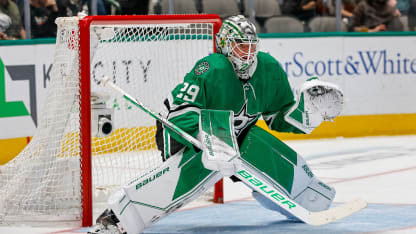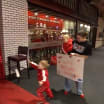Oettinger in peak condition for Stars, playoffs thanks to unique regimen
Mobility coach's work with goalie, other clients has helped expand range, prevent injuries

"I was like, you know what? Even if something crazy were to happen, I know he's doing his homework and we do enough work together where I'm not worried about his well-being, I guess," said Witthuhn, a mobility coach who has worked with Oettinger for more than two years. "Of course, I'm always worried about him, but I'm not worried that it's going to be compromised."
RELATED: [Complete Stars vs. Wild series coverage]
Be it Oettinger or others in the NHL, American Hockey League or overseas, Witthuhn has helped skaters and goalies improve their mobility and range, especially through the groin and hips.
Oettinger called Witthuhn "an expert."
"We do functional range conditioning," he said. "It's joint specific, trying to expand the range of joint capacity, that type of stuff. As a goalie, you put yourself through some weird positions you shouldn't be in and that prepares my body."
Outside of a lower-body injury that cost him four games this season, Oettinger has been relatively healthy since he was a rookie in 2020-21. The 24-year-old will likely start for the Stars against the Minnesota Wild in Game 1 of the Western Conference First Round at American Airlines Center on Monday (9:30 p.m. ET; ESPN2, SN360, TVAS2, BSSW, BSN, BSWIX) after going 37-11-11 with a 2.37 goals-against average, .919 save percentage and five shutouts in 62 games (61 starts) this season.
"It helps me make sure my body feels good every day and try to prevent injuries as much as I can," Oettinger said. "I think the stuff I've learned from her is a huge part of why I've been able to stay healthy and hopefully continue to do that. I do it every day and it helps me feel good."
Witthuhn has been training for about 10 years and is a former competitive bodybuilder. When she was 22 years old, she was diagnosed with rheumatoid arthritis and feared she was going to have to change careers. Then she discovered joint-specific training, which she uses herself and with clients.
"I found it based on a personal need and it was super hard," Witthuhn said. "I really couldn't do anything I saw, so that's what kind of made me like it more was the ability to effectively do it. And then when I started seeing how much it really had a positive impact on my clients when it came to pain and performance, that's kind of when I really dove headfirst into it."
One of the biggest things Witthuhn does with Oettinger and others is called P.A.I.L.s and R.A.I.L.s. She said the P stands for progressive, essentially lengthened, tissue and the R is regressive, for shortened tissue.
"All you do is build tension and a contraction in lengthened tissue, that progressive tissue and after that you switch immediately to an isometric contraction in shortened tissue, or the regressive tissue," Witthuhn said. "It's a tool that we use to utilize to increase the available range of motion.
"That's what we do to trick the nervous system into allowing us access to more tissue and then after that we can train it to reassure the nervous system that we want access to that tissue and that we're safe there. The nervous system allows us to move or not move, so when these guys are in stressful environments, like a live game or even a practice, their adrenaline is pumping. Their nervous system is basically going to control what they have access to, based on what feels safe pulling out in that dangerous situation."
Oettinger has introduced others to Witthuhn, including goalie Connor LaCouvee and forward Patrick Curry, his teammates at Boston University. LaCouvee is playing for Dukla Trencin in Slovak Extraliga, the top professional league in Slovakia.
"It's bene very beneficial in terms of the mobility, flexibility components of it, being able to elongate my muscles," LaCouvee said. "But I think another great component is the injury resistance, being able to sustain a full season of games, practices, without tearing your groins, hurting your hips, your quads, all that stuff. I think she does a great job of personalizing and outlining her programs to each individual athlete. She does a great job of addressing the individual needs and then writing the script toward them."
Curry, who plays for Iowa, the American Hockey League affiliate of the Wild, appreciates Witthuhn's "unique approach."
"Obviously one of the best goalies in the National Hockey League is using it, and it's extremely important for that position, so you can see how good it is," he said. "The biggest benefit I've taken from her is putting to memory some of the movements and some of the motions that she had me doing in person with her and putting that to memory and being able to do it on a daily basis throughout the season. When my hips or groins aren't feeling great, I can kind of go back to things that she showed me in the summer."
Witthuhn is happy to see how her work has helped her clients and excited to keep adding to her repertoire.
"I definitely didn't expect to get into the goalie niche, but it's really very challenging in the best way possible," she said. "It's very intellectually stimulating because while a lot of goalies have the same issues, everyone's body is different in how they train and what they've been told is different. So being able to produce, I'm not a fan of this term, but to produce the same bullet-proof hips on all of them, it's a really fun challenge for me. I'm looking forward to getting better at training this niche."

















